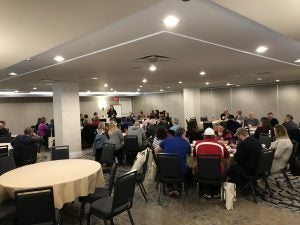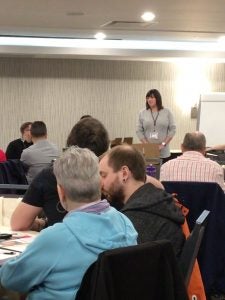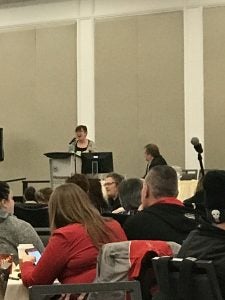
Attendees had the opportunity to ask questions and hear the candidates speak on many important topics. Now it is up to the voters to decide what they want. Don’t forget to vote June 7, 2018!
Supporting Education at Algonquin Lakeshore Catholic District School Board
CUPE 1479 delegates from the Negotiation Committee and two new Stewards attended the last OSBCC conference and the first OSBCU convention. There was a lot on the agenda this week! There was a lot of voting, information on LTD, benefits, classification meetings, addresses from Mark Hancock, Fred Hahn, Charles Fleury, Candice Rennick and so much more important information for the education sector. Watch out for the next newsletter for details!
















https://cupe.ca/rising-challenge-new-ontario-school-board-council-unions
Mary Unan | CUPE Communications
 This March, CUPE’s education workers in Ontario will hold the inaugural convention of their official new bargaining structure, the Ontario School Board Council of Unions (OSBCU).
This March, CUPE’s education workers in Ontario will hold the inaugural convention of their official new bargaining structure, the Ontario School Board Council of Unions (OSBCU).
When the council bargains centrally in 2019, it will represent 55,000 members employed by school boards in the province – CUPE’s largest bargaining table.
The idea of a council of unions for CUPE education workers was first put forward in 2008 by the Ontario School Board Coordinating Committee (OSBCC), which has led over a hundred CUPE school board bargaining unit in successive rounds of coordinated bargaining. Over the years, the strategy produced major gains for education workers, including sick leave for thousands of CUPE members who didn’t have it before (2012); funding to increase the hours of work for educational assistants (2008); and money for additional staffing and job security language (2015).
The OSBCC also played a vital role in CUPE’s successful Charter challenge to Ontario’s now-repealed Bill 115. In 2017, the challenge won a remedy of $56.7 million for more than 60,000 current and former CUPE education workers.
At the same time, legislative developments were transforming the bargaining landscape. Last year, the provincial government passed the School Boards Collective Bargaining Amendment Act 2017, which made central bargaining mandatory for unions representing education workers in Ontario.
The new legislation obliged CUPE education workers to adopt a new structure that would serve as a recognized bargaining agent in central bargaining.
In response, the OSBCC formed a restructuring committee which consulted members, designed a democratic structure, and drafted a new budget and bylaws. In November 2017, members adopted the bylaws and endorsed the formation of a council of unions.
The OSBCU is now chartered as a bargaining council under the CUPE National Constitution. The new structure will lead central bargaining in 2019 – in what could be a very different political environment – and carry out provincially organized campaigns to focus attention on the issues that affect students, schools, communities, and CUPE members working for school boards.
The transition hasn’t been without its critics. Some locals worry about a loss of local autonomy, but that democratic value won’t change under the new council. Others express concerns about increased affiliation costs. But leaders point out that the OCBCU will offer value for money to its affiliated locals, providing many benefits, including arbitration of central issues, a central process for sharing grievance data, and the opportunity for local representation at the central bargaining table.
The OSBCU looks forward to working on behalf of CUPE education workers from all locals, large and small. Together, we will continue to build the strong legacy of bargaining agreements that recognize and promote the vital role that CUPE members play in Ontario schools.